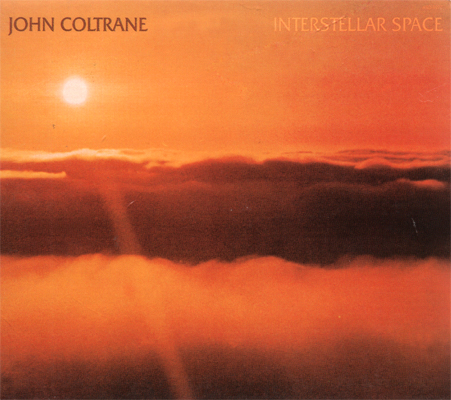- Interstellar Space
Infobox Album |
Name = Interstellar Space
Type =Album
Artist =John Coltrane

Genre =Jazz
Length = 54:06
Reviews = *"Rolling Stone " (favorable) [http://www.rollingstone.com/artists/johncoltrane/albums/album/314501/review/6067466/interstellar_space link]"Interstellar Space" was the one of the final studio albums recorded by the saxophonist
John Coltrane before his death in 1967, originally-released posthumously byImpulse! on LP in 1972. It consists of an extended duet suite (in four parts) with the drummerRashied Ali , and was recorded at theVan Gelder Studios on February 22, 1967, the week after the session that produced "Stellar Regions ". As a result, the melodies often overlap; "Venus" has the same melody as the title track of the previous LP, "Mars" quotes the melody of what became known as "Iris", and many note choices and runs are similar.The structure of each track is fairly uniform: Coltrane plays some largely ceremonial wind-chime like bells, while Ali sets a shifting pattern on the drums; then the theme is stated by Coltrane on
tenor saxophone . The album is an important example of highly improvisedfree jazz , which was Coltrane's principal interest in the latter part of his career. Coltrane's improvisations are thus extremely free here, stating tacit modes and harmonies briefly and modulating constantly, fitting extremely dense, twisting expressions into breath-length phrases. The folkish "Venus" is probably the most accessible number; "Saturn", the longest piece, does feature hints of swing by song's end. Its melody is rather similar to the canonical, almost cantor-like quality of the material on "Stellar Regions".Many critics have noted the influence of the younger saxophonist
Albert Ayler on Coltrane's sound during this period.Covers
In
1999 guitaristNels Cline and drummerGregg Bendian collaborated on "". This version saw Cline and Bendian offering their vision of "Mars", "Leo", "Venus", "Jupiter" and "Saturn", from the "Interstellar Space" sessions.Bonus tracks
"Leo", also listed as such on Coltrane's "Live in Japan"
box set , is presumably a variation on "The Father, the Son, and the Holy Ghost" from the 1965 LP "Meditations". (The theme for "Leo" was frequently played in conjunction with the two-tenor opening for "The Father, the Son and Holy Ghost" in concert, though it is always called "Leo" in Impulse! sessions.) It is distinct, in title and structure, from the rest of the album. Firstly, it is named for an astrological sign rather than a planet; furthermore, the track opens not with an introduction by Ali, but rather, by an immediate statement of the theme by Coltrane. As well, the use of bells is different, appearing intermittently, and mostly towards the end. In this sense it is similar to the track "Saturn", which contains no bells at all.Track listing
# "Mars" – 10:41
# "Venus" – 8:28
# "Jupiter" – 5:22
# "Saturn" – 11:33
# "Leo" * – 10:53
# "Jupiter variation" * – 6:44"*" Bonus tracks on CD issued in 2000 by
Impulse! Records .* The 2000 CD reissue also includes a brief rehearsal fragment as well as two false starts of "Jupiter Variation" and studio chatter between Coltrane and Ali. These outtakes are hidden in the pre-gap before Track 1. The CD must be 'rewound' from Track 1 in order for these outtakes to be heard.
Personnel
*
John Coltrane —tenor saxophone , bells
*Rashied Ali — drums
Wikimedia Foundation. 2010.
